
- Join our Team
- Online Platform Tutorial
- TEFL Courses
- Contact Us / FAQ
Forgot Username or Password
- Active vs. Passive Voice
- Adverbial Clauses
- Adverbial Phrases
- Be Going To Statements
- Be Going To Wh Questions
- Be Going To Yes/No Questions
- Be Going To & Present Continuous
- Comparatives
- Superlatives
- Comparatives & Superlatives
- Zero Conditional
- First Conditional
- Second Conditional
- Third Conditional
- Mixed Conditionals
- Future Continuous
- Future Continuous vs. Future Perfect
- Future Perfect Continuous
- Future Perfect Simple
- Future Simple
- Future Tenses
- Future Time Clauses
- Gerunds & Infinitives
- Have Got & Has Got
- I wish & If only
- Imperatives
- Irregular Verbs
- Narrative Tenses
- Noun Clauses
- Noun Phrases
- Passive Voice
- Past Continuous
- Past Perfect
- Past Perfect Continuous
- Past Perfect Simple & Continuous
- Past Simple Affirmative & Negative
- Past Simple Passive
- Past Simple Regular Verbs
- Past Simple Was and Were
- Past Simple Wh Questions
- Past Simple Yes/No Questions
- Past Simple vs. Past Continuous
- Past Simple vs. Present Perfect
- Past Tense Review
- Present Continuous
- Present Perfect
- Present Perfect Continuous
- Present Perfect - Ever and Never
- Present Perfect - For and Since
- Present Perfect - Just, Yet & Already
- Present Simple Affirmative & Negative
- Present Simple Passive
- Present Simple vs. Present Continuous
- Present Simple vs. Present Perfect
- Present Simple Wh Questions
- Present Simple Yes/No Questions
- Present Tense Review
- Question Words
- Relative Clauses
- Reported Speech
- Subject-Verb Agreement
- Tag Questions
- There is & There are
- Wh Questions
- Abstract Nouns
- Adjective-Noun Collocations
- Adjectives of Feeling & Emotion
- Adjectives of Opinion
- Adjectives of Quantity
- Adjective Opposites
- Adjective Order
- Adjective-Preposition Collocations
- -ed and -ing Adjectives
- Adverb-Adjective Collocations
- Adverb Order
- Adverbs of Affirmation & Negation
- Adverbs of Degree
- Adverbs of Frequency
- Adverbs of Manner
- Adverbs of Place
- Adverbs of Time
- Articles - a, an, the
- Causative Verbs
- Collective Nouns
- Common & Proper Nouns
- Compound Adjectives
- Compound Nouns
- Concrete Nouns
- Conjunctions
- Countable & Uncountable Nouns
- Demonstrative Adjectives
- Demonstrative Pronouns
- Dependent Prepositions
- Indefinite Pronouns
- Intensifiers & Mitigators
- Interjections
- Modal Verbs of Ability
- Modals of Deduction & Speculation
- Modals of Necessity
- Modals of Obligation & Prohibition
- Modals of Possibility & Certainty
- Onomatopoeia
- Parts of Speech
- Phrasal Verbs
- Possessives
- Prepositions of Movement
- Prepositions of Place
- Prepositions of Time
- Proper Adjectives
- Quantifiers
- Reflexive Pronouns
- Sense Verbs and Adjectives
- Singular & Plural Nouns
- So and Such
- Subject & Object Pronouns
- Too and Enough
- Transition Words
- Verb-Noun Collocations
- Agreeing & Disagreeing
- Asking Permission
- At the Dentist's
- At the Doctor's
- Being Polite
- Classroom Language
- Complaining & Apologizing
- Complimenting
- Critical Thinking & Problem Solving
- Describing Character & Personality
- Describing People's Appearance
- Describing Places
- Describing Things
- Etiquette and Manners
- Getting Around
- Getting to Know You
- Giving Advice
- Giving Directions
- Giving Opinions
- Giving Personal Information
- Greetings & Introductions
- Indirect Questions
- Likes and Dislikes
- Making Arrangements
- Making Decisions
- Making Excuses
- Making Invitations
- Making Offers & Promises
- Making Requests
- Making Suggestions
- Online Communication
- Ordering Food & Drink
- Social Media
- Telephoning
- Times and Dates
- British English vs. American English
- Cities, Towns & Places
- Clothes & Fashion
- Computers & Smartphones
- Countries & Nationalities
- Crime, Law & Punishment
- Cultural Celebrations
- Daily Routines
- Everyday Obects
- Family & Relationships
- Food & Drink
- Going Out & Entertainment
- Health & Fitness
- Hobbies & Free Time
- Houses, Rooms & Furniture
- Jobs & the Workplace
- Love, Romance & Dating
- Modes of Transport
- Parts of the Body
- Reading Comprehension
- Shapes & Measurements
- The Natural World
- Time Expressions
- TV & Film
- Valentine's Day
- Academic Collocations
- Academic Reading Comprehension
- AWL Sublist 1 & 2
- Cause and Effect Essays
- Compare and Contrast Essays
- Discussion Essays
- Discussions
- Essay Writing
- Paragraph Writing
- Persuasive Essays
- Presentation Skills
- Problem Solution Essays
- Punctuation
- Reading Skills
- Referenced Essays
- Study Skills
- The Writing Process
- Business Collocations
- Business Emails
- Business Idioms
- Business Meetings
- Business Negotiations
- Business Phrasal Verbs
- Closing a Presentation
- Describing Graphs & Charts
- Presentation Language & Structure
- Resumes, CVs & Email Cover Letters
- Starting a Presentation
- Talking About Jobs
- Answer Games
- Brainstorming Games
- Category Games
- Classic Childhood Games
- Counting Games
- Describing Games
- Drawing Games
- Drilling Activity Games
- First Day of Class Games
- Flashcard Games
- Grammar Games
- Hangman Games
- Listening Games
- Miming Games
- Music Games
- Question & Answer Games
- Sentence Race Games
- Spelling Games
- TV Game Shows
- Vocabulary Games
- Word Association Games
- Yes/No Question Games
- Classroom Interaction Patterns
- Classroom Management
- Concept Checking
- Cultural Awareness
- Developing Students' Listening Skills
- Developing Students' Reading Skills
- Developing Students' Speaking Skills
- Eliciting Techniques
- ESL Dictations
- How to Introduce a Lesson
- How to Use Music in ESL Class
- Lesson Planning
- Making Teaching Materials Relevant
- Problems Learning English
- Teaching English Idioms
- Teaching English Vocabulary
- Teaching Large Classes
- Teaching Mixed-Ability Classes
- Teaching Small Classes
- The First Day of Class
- Using Correction in Class
- Using Song Gap Fills
- Online Membership
- ESL Essentials eBook Series

Reported Speech ESL Games, Activities and Worksheets
- Pre-intermediate ( A2 )
- Intermediate ( B1 )
- Upper-intermediate ( B2 )

But he told me...
Esl reported speech activity - grammar and speaking: asking and answering questions, forming sentences, true or false, guessing - group work - pre-intermediate (a2) - 40 minutes.
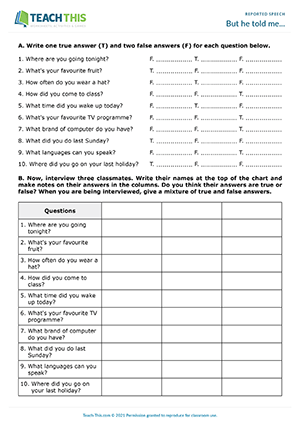
Double Trouble
Esl direct and indirect speech game - grammar and speaking: pelmanism, reforming sentences, controlled practice - group work - pre-intermediate (a2) - 20 minutes.
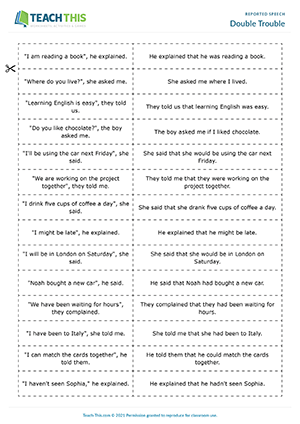
ESL Reported Speech Game - Grammar and Speaking: Reading and Responding to Statements, Forming Sentences, Controlled Practice - Pre-intermediate (A2) - 35 minutes
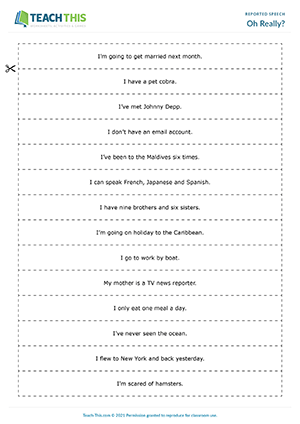
You said...
Esl reported speech game - grammar and speaking: miming, guessing, forming sentences - group and pair work - pre-intermediate (a2) - 25 minutes.
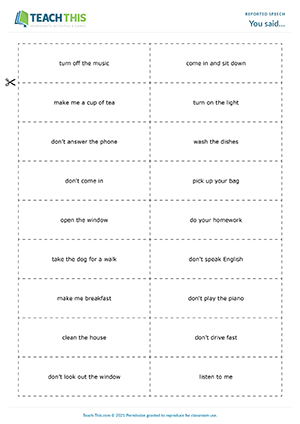
Report This
Esl reported speech activity - grammar and speaking: asking and answering questions, forming sentences - pair work - intermediate (b1) - 30 minutes.
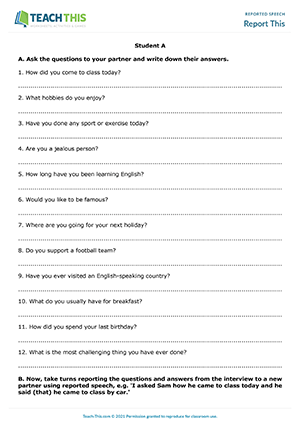
Reporting Modal Verbs
Esl reporting modal verbs worksheet - grammar exercises: identifying, matching, gap-fill, rewriting sentences, writing a paragraph - intermediate (b1) - 30 minutes.
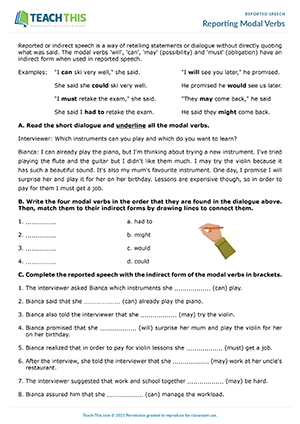
Run and Report
Esl reported speech activity - reading, speaking and grammar: running dictation, rewriting sentences - pair work - intermediate (b1) - 25 minutes.
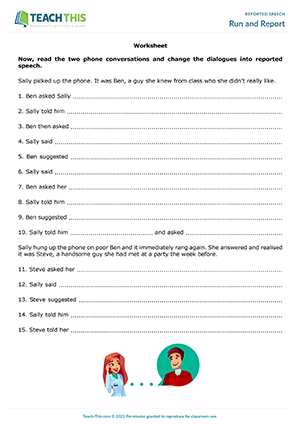
Somebody told me that...
Esl reported speech activities - speaking activity: asking and answering questions - grammar game: forming sentences, guessing - group work - intermediate (b1) - 45 minutes.
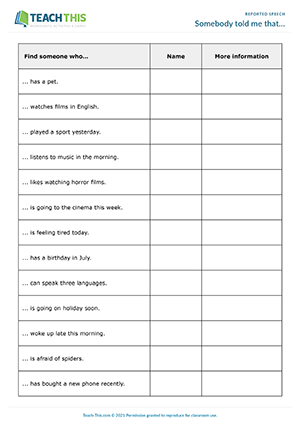
Telephone Messages
Esl reported speech game - grammar and speaking: asking and answering questions from prompts, freer practice - group work - intermediate (b1) - 25 minutes.
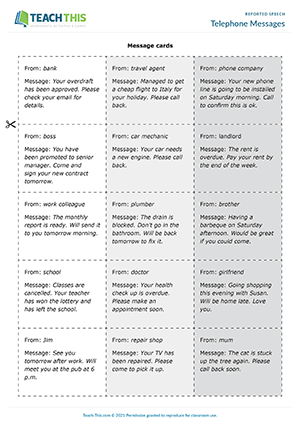
Trip Around the World
Esl reported speech activity - grammar, speaking and writing: writing questions and answers, role-play, interview, writing a short article - group and pair work - intermediate (b1) - 45 minutes.
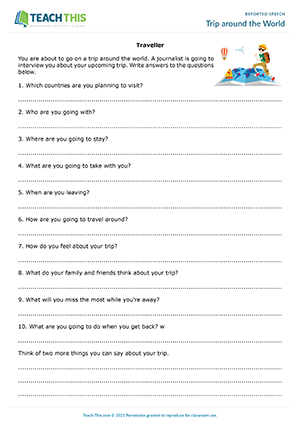
What did they say?
Esl reported speech game - grammar and speaking: asking and answering questions from prompts, writing sentences, controlled and freer practice - group work - intermediate (b1) - 45 minutes.
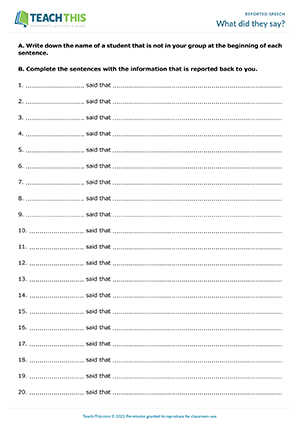
What did you ask me?
Esl reported speech activity - grammar, speaking and writing: asking and answering questions, writing sentences - pair work - intermediate (b1) - 45 minutes.
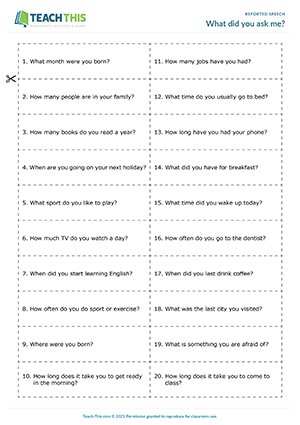
I asked you not to...
Esl reported speech game - grammar: forming sentences from prompts - group work - upper-intermediate (b2) - 45 minutes.
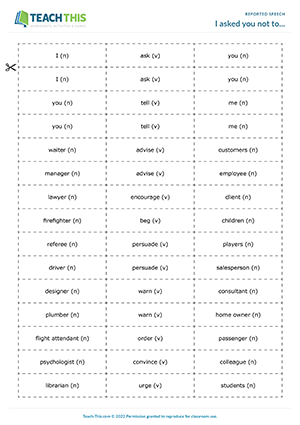
Infinitive Clauses Practice
Esl infinitive clauses worksheet - grammar exercises: binary choice, gap-fill, matching, unscrambling, rewriting sentences - upper-intermediate (b2) - 25 minutes.
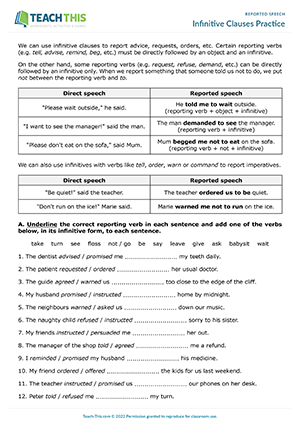
Listening In
Esl reported speech game - grammar: sentence completion, guessing - group and pair work - upper-intermediate (b2) - 25 minutes.
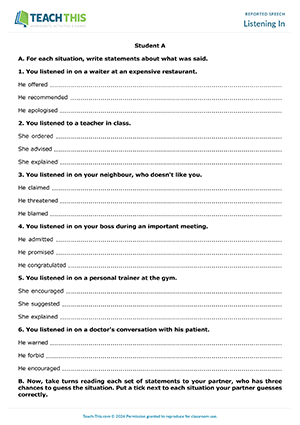
New Teaching Resources eBooks
Now Available!
Get Started Here
https://www.teach-this.com/esl-essentials
LATEST FREE RESOURCES
Elementary (A1-A2)
Upper-intermediate (B2)
Cities and Towns
Pre-intermediate (A2)
LATEST MEMBER RESOURCES
Food and drink.
- Talking about Jobs
Negotiations

- Have got & Has got
- Adverbs of Affirmation and Negation
- Concrete nouns
- Sense Verbs & Adjectives
- Everyday Objects
- AWL Sublist 1 and 2
- TEFL Certification & Courses
- Privacy Policy
- Terms of Use
ESL Speaking
Games + Activities to Try Out Today!
in Activities for Adults · Activities for Kids
Tell your Story | ESL Speaking Activity to Practice Reported Speech
If you’re looking for a reported speech speaking activity, look no further than tell your story . It’s a fun reported speech activity to try out with your higher-level ESL or EFL students. Keep on reading for all the details you need to know about teaching indirect speech!
Speaking Activity to Practice Reported Speech
You can often find a unit on reported speech in most intermediate-level English textbooks. But, it’s not that easy to design some ESL activities to practice this. Not to worry. Keep on reading for one of the best reported speech activities to try out with your students.
Check out one of my favourites: “Tell a Story.” It’s fun, and engaging, and creates some great opportunities for students to practice this important skill. Reported speech activities don’t have to be terrible any longer! Have some fun with reported speech ESL.
Reported Speech ESL Speaking Activity
Skills: Writing/reading/speaking/listening Time: 15-30 minutes Level: Intermediate to Advanced Materials Required: Nothing
Have students write something interesting. Some examples are the most embarrassing moment, the scariest thing you’ve ever done, your dream for the future, future predictions , etc. Base it on whatever topic you are studying in class that day. Make it clear to the students that it should be something they’re willing to share with the entire class so as not to write something very private.
Then, distribute the stories to other people in the class. Then the students have to go around the class, finding the person whose story they have by asking questions. Once they find that person, they have to ask them three interesting questions about the story. And the person who originally wrote the story has to answer them of course.
I like this part of it because it gets students up and out of their seats, moving around and talking to different people. It gets boring sitting down all the time and talking to only 1 person! It’s ideal for those sleepy classes that you might have on Friday afternoon or those ones who are just waking up on Monday morning.
Reported speech ESL activities
Teaching Tips for Tell Your Story:
Emphasize to students that they are to practice asking good questions. For example, “USA?” is not a good question, while, “Did you study abroad in the USA?” is much better. Full sentences are the key here.
Also, emphasize that students should think of interesting follow-up questions that expand upon their knowledge about that situation. This involves reading carefully so they can avoid asking about things that are already mentioned.
You can give your students a couple of minutes before the activity starts to write down a few questions based on the paper they received to help facilitate this. Based on the topic you’ve assigned for the story, there should be some obvious ones that they’d want to ask.
This activity provides an excellent opportunity for your students to work on reported speech. This is something that high-level students are often surprisingly weak at. If you have a small class (less than 10), students can report what they learned about their partner to everyone.
If larger, students can tell their seating partner what they learned. For example, students might say something like, “I talked to Min-Ji. She told me that she got in a car accident last year. She said that it was really scary, but thankfully nobody got injured seriously.”

Procedure for this Reported Speech Activity:
- Have students write an interesting story based on a certain topic. Adjust for length and difficulty depending on your students.
- Collect stories and redistribute them–one per student, making sure a student does not get their own story.
- Students go around the class asking people if that is their story. For example, “Did you get in a car accident when you were little?”
- When they find the person, they must ask them three interesting follow-up questions about it.
- Do the optional variation of having students tell other people what they learned about their classmate in order to practice using reported speech.
- Follow-up with a worksheet, other activity or homework assignment.
Do You Like this Reported Speech ESL Speaking Activity?
- Amazon Kindle Edition
- Bolen, Jackie (Author)
- English (Publication Language)
- 148 Pages - 03/09/2016 (Publication Date)
If you like this ESL speaking activity to help your students practice reported speech, then you’re going to love this book: 101 ESL Activities: For Teenagers and Adults . It’s lesson planning made easy, guaranteed. The key to better English classes is a wide variety of engaging and interactive games and activities and this book will help you get there in style.
There are dozens of top-quality ESL games and activities for teenagers and adults that are organized into various categories: reading, writing, speaking, writing, warm-ups, and 4-skills. You’re sure to find something that will work for any level of students or topic.
You can get the book on Amazon in both print and digital formats. The (cheaper!) digital copy can be read on any device by downloading the free Kindle reading app. It’s super easy to have fun, engaging ESL activities with you anywhere you go.
Or, buy the book and keep it as a handy reference on your bookshelf, or teacher supply room. You can check out 101 ESL Activities for yourself over on Amazon:
Teaching Reported Speech FAQs
There are a number of common questions that people have about reported speech games and activities for English learners. Here are the answers to some of the most popular ones.
What is reported speech in English?
Reported speech is when we talk about or repeat what someone else has said using our own words.
Why do we use reported speech?
We use reported speech to share information, statements, or questions that someone else has said.
What changes occur when turning direct speech into indirect speech?
Pronouns, tense, and time expressions often change for indirect speech.
Can you give an example of direct speech changing to reported speech?
Direct: She said, “I am going to the store.” Reported: She said that she was going to the store.
What happens to the pronouns in reported speech?
Pronouns usually change to match the perspective of the speaker in reported speech.
How do you shift tenses in reported speech?
Generally, you shift the tense back one step. For example, present simple becomes past simple.
Do all time expressions remain the same in indirect speech?
No, time expressions usually change, e.g., “now” becomes “then,” “today” becomes “that day.”
What’s the reporting verb?
The verb that introduces indirect speech can be things like, “said,” “told,” “asked.”
Can questions be reported too?
Yes, questions can be reported using reporting verbs like “asked” or “wondered.”
How do you report imperative sentences?
Imperative sentences are reported using the verb “to” + infinitive, or with phrases like “ordered” or “told.”
What’s the key to successfully teaching indirect speech to ESL students?
Practice and exposure through various exercises and real-life examples are crucial for understanding indirect speech.
Reported speech games and activities for ESL
Tell your Story English Speaking Activity: Have your Say!
What do you think of this activity to practice ESL reported speech? Is it a good one or do you have another reported speech lesson plan activity that you’d like to recommend? Leave a comment below and let us know your thoughts. We’d love to hear from you.
Also be sure to give this article a share on Facebook, Pinterest, or Twitter. It’ll help other busy teachers, like yourself find this useful resource.
Last update on 2024-04-25 / Affiliate links / Images from Amazon Product Advertising API
About Jackie
Jackie Bolen has been teaching English for more than 15 years to students in South Korea and Canada. She's taught all ages, levels and kinds of TEFL classes. She holds an MA degree, along with the Celta and Delta English teaching certifications.
Jackie is the author of more than 100 books for English teachers and English learners, including 101 ESL Activities for Teenagers and Adults and 1001 English Expressions and Phrases . She loves to share her ESL games, activities, teaching tips, and more with other teachers throughout the world.
You can find her on social media at: YouTube Facebook TikTok Pinterest Instagram
Leave a Reply Cancel reply
Your email address will not be published. Required fields are marked *
Our Top-Seller
As an Amazon Associate, I earn from qualifying purchases.
More ESL Activities
Describing words that start with n (“n” adjectives), adjectives with the letter a | list of a adjectives, 100 common english questions and how to answer them, five letter words without vowels | no vowel words, about, contact, privacy policy.
Jackie Bolen has been talking ESL speaking since 2014 and the goal is to bring you the best recommendations for English conversation games, activities, lesson plans and more. It’s your go-to source for everything TEFL!
About and Contact for ESL Speaking .
Privacy Policy and Terms of Use .
Email: [email protected]
Address: 2436 Kelly Ave, Port Coquitlam, Canada
ESL Activities
ESL Games, Activities, Lesson Plans, Jobs & More
in Listening · Reading · Speaking
Reported Speech Games, Activities, Worksheets and Lesson Plans
If you’re looking for some of the best reported speech games and activities, then you’re certainly in the right place. Keep on reading for our top picks, along with worksheets, lesson plans and more.

Reported speech activities
ESL Reported Speech Games
Let’s get into the best activities and games for English learners.

#1: Reported Speech Board Game
I love to play board games in real life which is why I also like to play them with my students! It’s super easy to make your own to use for just about any grammatical point, including this concept.
In this case, fill the board with a bunch of statements like the following:
- Sister-has boyfriend
- Friend-fired from job
- Dad-playing golf tomorrow
Then, students have to make a reported speech statement using the information. It’s fun, engaging and a nice way to give students some practice with this important concept.
Check out this simple ESL board game so you can see how easy it is to make your own:
ESL Board Game .
#2: Ball Toss
This is a simple but versatile activity that’s perfect for reported speech. I write down a number of questions on the beach ball. Then, students take turns tossing the ball to each other and the person that catches it has to answer the question under their right thumb.
To add a reported speech element, have another student (the one who threw the ball?) report on that student’s answer. It’s simple but effective! Check it out:
Ball Toss Activity .
#3: Is that Sentence Correct
If you want to focus on forms, then consider using this simple error correction activity. Write some sentences that use the target grammar. Some have errors while others do not. Students have to find the incorrect ones and make the required changes.
It’s possible to do this in class, or for a homework activity. Have a look here:
Is that Sentence Correct?
#4: Running Dictation
#5: mixed up sentences.
Making good sentences using reported speech can be a little bit tricky. If you want to focus on forms, consider using this simple activity.
Write some sentences on the board of PowerPoint, but mix them up in terms of the order. Students have to work quickly to put them in the correct order and the first time to finish is the winner. It also makes a nice homework assignment. Try it out for yourself:
Mixed Up Sentences .
- Amazon Kindle Edition
- Bolen, Jackie (Author)
- English (Publication Language)
- 137 Pages - 09/27/2020 (Publication Date)
#6: Man/Woman on the Street Interview Activity
If you want to level up the typical ESL interview activity, consider using Man or Woman on the Street. Then, to make it into a reported speech activity, have students tell someone else about what they heard. It’s fun, engaging, and lends itself well to this grammar point. Find out more:
Man/Woman on the Street Activity .
#7: Concentration
This is a fun memory game that’s ideal for a whole bunch of different grammar or vocabulary points. On one card, write down a statement, and then on the other, write down the correct form.
- I have a boyfriend (She told me that she has a boyfriend).
Make a number of these sets. I usually do 8 of them per group of 4. Then, students play a matching memory game. Learn more here:
Concentration Game .
#8: Vocabulary Auction
Please enable JavaScript
#9: Find Someone Who Bingo Game
This is a nice icebreaker activity that can also be used for some practice with this grammar point. Students have to circulate around the class, asking their classmates questions to find people to fill their Bingo grid.
To make this into a reported speech activity, have students report some of the things they learned about their classmates to a partner (bigger classes) or to the entire class (smaller classes). Find out more about it:
Find Someone Who Bingo Game .
#10: More Ideas for Teaching English
#11: dictogloss and reported speech.
This is a challenging ESL activity that’s perfect for developing listening skills. It also lends itself to almost any vocabulary set or grammatical point, including this one.
Find (or write) a passage of people talking about something that they heard.. Then, put students into pairs and read it out at a faster than normal pace. Students take notes and then attempt to recreate what they heard. Repeat the process again. Finally, they can compare what they have with the original. Check it out:
Dictogloss Activity .
#12: Surveys and Reported Speech
I love to use surveys and questionnaires in my classes. They’re engaging, student-centred and cover a range of skills in a single activity. They’re also great for working on this concept if you get each student to tell their partner some of the things they learned about their classmates.
This is a simple way to cover a new concept but have a quick review of this grammar point as well. Take a look at this activity:
ESL Surveys .
ESL games and activities
#13: Brochure Scanning Activity
This is a nice activity if you have a bunch of different travel brochures. Have students quickly scan them to find important information. For example:
- number of days
Then, have students use reported speech to tell their partner about the trip. Find out more:
Brochure Scanning Activity .
#14: ESL Review Games and Activities
#15: daily routine activities and reported speech.
In terms of topics to combine with this concept, daily routine is one of the best. It’s very simple to set up activities that lead to sentences like the following:
- Tim told me that he gets up at 7 am.
- Jenny said that she usually sleeps in on the weekends.
For some more ideas, have a look here:
Daily Routine ESL Activities .
#16: Error Correction Relay Race
This is a simple activity that takes something old (error correction) and makes it new again. Students have to work in teams to fix errors in a number of reported speech sentences. The first team to make all the corrections is the winner!
Want to give it a try? Learn more:
Error Correction Relay Race .
#17: Dialogue Substitution
#18: news reporting.
Provide students with news headlines or short news articles. Ask them to transform from direct speech (quoted speech) to reported speech (indirect speech) when retelling the news. This activity helps students practice the appropriate changes in verb tenses, pronouns, and time and place references.
#19: Interview and Report
Pair students up and ask them to conduct mock interviews. Afterward, have them report the interview to a different partner using reported speech. This activity allows students to practice converting direct speech into reported while maintaining the meaning and context of the conversation.
#20: Picture Stories
Provide students with a series of pictures that depict a sequence of events. Ask them to create a story using reported speech to describe what is happening in each picture. This activity encourages students to use this language in a narrative context and practice converting direct speech into reported speech.
#21: Role Plays
Create role play scenarios where students take on different roles and engage in conversations. Afterward, ask them to report the conversations to another person using reported speech. This activity allows students to practice converting direct speech into reported speech in a context that mimics real-life situations.
#22: Song Lyrics Transformation
Choose a song that contains direct speech and ask students to rewrite the lyrics using reported speech. This activity helps students practice converting direct speech in songs into reported speech while exploring the meaning and context of the lyrics.
Online Practice for Reported Speech
There are a number of sites for online practice and quizzes that cover this. They are excellent resources to recommend to students who want a little bit of extra practice. Check it out here:
Perfect English Grammar
Exam English
My English Pages
Reported Speech ESL Lesson Plans
There are lots of nice lesson plans. Here are some of the best ones to consider using:
Lingua House
Reported Speech Worksheets
If you’re a busy teacher then you’re going to know what a huge time saver it can be to use worksheets that other teachers have made. Here are some of the top picks:
ISL Collective
English Grammar
There are a number of common questions that people have about using this method of speech. Here are the answers to some of the most popular ones.
What is reported speech ESL?
Reported speech ESL is when we tell someone what another person said. You often have to use a tense that is further back in time (backshift) and may also need to change the pronouns.
What are some examples of reported speech?
Some examples of reported speech are the following:
- They said you didn’t want to come.
- My mom told me that she was angry at my dad.
- I asked her what her plans were.
How do you teach reported speech?
To teach reported speech, first set the context with a short video clip, discussion question, etc. Then, explain the grammar rules for it and do some controlled practice. Finally, use an ESL game or activity that allows students to practice further.
What are the types of reported speech?
The types of reported speech are direct speech and indirect speech.
Tips for Teaching Reported Speech To English Learners
Teaching reported speech to ESL learners can be challenging, as it involves a shift in verb tense and pronoun usage. Here are some tips to make the teaching process more effective and engaging.
Start with Direct Speech
Begin by introducing and reviewing direct speech, which is the original statement or question spoken by someone. Ensure students are familiar with the use of quotation marks and the appropriate verb tenses in direct speech.
Introduce Reporting Verbs
Teach students a variety of reporting verbs such as say, tell, ask, explain, suggest, etc. Explain the different patterns that follow these reporting verbs, including the use of direct objects, indirect objects, and prepositions.
Present Tense Changes
Demonstrate how to change verb tenses when reporting speech. Provide clear examples of how present simple changes to past simple, present continuous changes to past continuous, and so on. Reinforce the importance of maintaining accuracy in verb tense changes.
Practice Conversion of Pronouns
Show students how pronouns change when reporting speech. Explain the transformation from the speaker’s pronouns (I, you, we) to the appropriate pronouns in reported speech (he, she, they). Emphasize the use of possessive pronouns when necessary.

Provide Contextualized Examples
Use authentic materials, such as dialogues, interviews, or news articles, to provide meaningful examples of reported speech. This helps students understand the purpose and practical application in real-life situations.
Use Reporting Structures
Teach students reporting structures, such as reporting statements, reporting questions, and reporting commands. Practice transforming direct speech into reported speech using these structures and provide opportunities for students to generate their own examples.
Focus on Reporting Verbs of Perception
Highlight reporting verbs of perception like see, hear, feel, notice, etc., which require a change in verb tense but do not require reporting the exact words. Provide examples to help students understand the difference between reporting statements and reporting verbs of perception.
Incorporate Speaking and Writing Activities
Encourage students to practice reported speech through role-plays, interviews, or storytelling activities. Assign writing tasks where students report a conversation or summarize an article using reported speech.
Address Common Errors
Be aware of common errors students make when learning reported speech, such as incorrect verb tense changes or pronoun usage. Provide corrective feedback and offer opportunities for targeted practice to overcome these challenges.
Review and Reinforce
Regularly review with students and provide opportunities for reinforcement through quizzes, games, or interactive exercises. Repetition and reinforcement are key to solidifying understanding and application of this language.
Did you like these Reported Speech Activities?
- 87 Pages - 10/24/2019 (Publication Date)
Yes? Thought so. Then you’re going to love this book on Amazon: 39 No-Prep/Low-Prep ESL Grammar Activities for Teenagers and Adults . It’s the book you need if you want to have more engaging and interactive grammar lessons.
You can find the book in both digital and print formats. Keep a copy on the bookshelf in your office to use as a handy reference guide. Or, take the e-version with you to your favourite coffee shop for some lesson planning on the go.
Whatever the case, get ready for some ESL grammar teaching awesome in your life. Head over to Amazon to find out more about it:
Have your Say about Reported Speech Games and Activities
What do you think about these activities? Are they a winner, or do you have another one that you’d like to recommend? Leave a comment below and let us know what you think. We’d love to hear from you.
Also, be sure to give this article a share on Facebook, Pinterest, or Twitter. It’ll help other busy English teachers, like yourself find this useful resource.
Last update on 2022-07-17 / Affiliate links / Images from Amazon Product Advertising API
About Jackie
Jackie Bolen has been teaching English for more than 15 years to students in South Korea and Canada. She's taught all ages, levels and kinds of TEFL classes. She holds an MA degree, along with the Celta and Delta English teaching certifications.
Jackie is the author of more than 60 books for English teachers and English learners, including Business English Vocabulary Builder and 39 No-Prep/Low-Prep ESL Speaking Activities for Teenagers and Adults . She loves to share her ESL games, activities, teaching tips, and more with other teachers throughout the world.
You can find her on social media at: YouTube Facebook Pinterest TikTok LinkedIn Instagram
Top Selling ESL Activity Book
As an Amazon Associate, I earn from qualifying purchases.
More ESL Activities and Games
Zero conditional activities, games, worksheets & lesson plans, birthday would you rather questions | this or that birthday, esl clothing activities and games | fun esl clothes games to try out, shape names with pictures | shapes in english for esl/efl, about, contact, privacy policy.
Best-selling author and English teacher Jackie Bolen has been talking ESL activities and games since 2015. The goal is to bring you the best ideas, lesson plans, and activity recommendations for your TEFL classes.
Get in touch: About + Contact
Privacy Policy and Terms of Use
Email: [email protected]
Address: 2436 Kelly Ave, Port Coquitlam, Canada

Reported Speech Activities
Crazy questions.
This is just a quick exercise to check understanding of reported speech questions.
Put some examples on the board:
Do you eat bananas in the shower?
Do you drive with your eyes closed?
Do you wear socks on your head?
Are you married to a ghost?
Have you ever eaten a lion?
Ask students to try and come up with a few more examples.
Then, going around the class each student, in turn, asks the person on their left a crazy question.
Now ask the person who was asked What did he/she ask you?
He asked me if I ate bananas in the shower.
One thought on “ Reported Speech Activities ”
Haha, an amazing activity
Leave a Comment Cancel reply
Your email address will not be published. Required fields are marked *
This site uses Akismet to reduce spam. Learn how your comment data is processed .
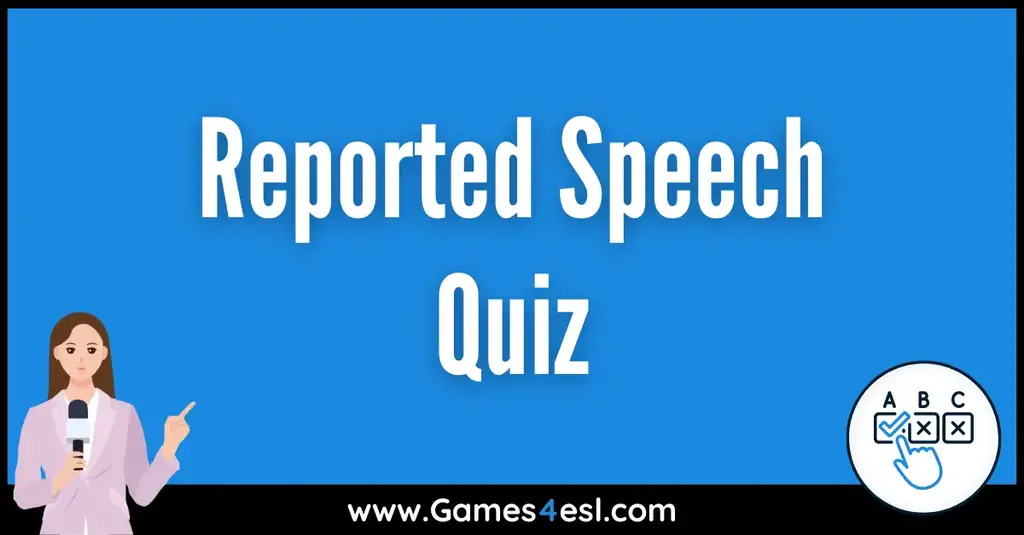
Reported Speech Quiz
Test your understanding of Reported Speech in English with this Reported Speech Quiz. Reported Speech, also known as indirect speech, is used to convey what someone else said without quoting their exact words. It often involves changes in tense, pronouns, and time expressions to suit the reporting context. For example, direct speech: “ I am learning English, ” becomes in reported speech: “ She said she was learning English. ” This quiz has 15 questions and each question will ask you to change the direct speech into reported speech. Take The Quiz Below!
Not learned about reported speech yet? Then check out this Reported Speech Guide which includes lots of examples to help you master this important part of English grammar.
Yet Another 15 Games for Reported Speech
1. Reporting the whole course Students report something someone in the class (including the teacher) said, and the other students try to guess or remember who said it. This is nice near the end of a course or as part of a revision lesson.
2. Tell on his errors Students watch a segment of a video where a character makes stupid verbal blunders, e.g. the Rowan Atkinson priest character in “Four Weddings and a Funeral” and listen for things they shouldn’t have said. When you stop the video they get one point for each mistake they report but lose one point if the thing they report was actually what the person meant to say/ should have said.
3. We’ve heard that story before Students write a story and add one of the events (e.g. the vase getting broken) a second time where it shouldn’t be. When they change groups their new partner has to listen carefully to the story and report anything they hear repeated with phrases like “But you said you had already shot him dead before the police arrived”. With less creative classes or to save time, this activity can also be done with them being given the stories but adding the repeated parts themselves.
4. It’s my story, I’ll mix it up if I want to Students work together to put a worksheet of pictures or words in some order to make a story, but without writing anything down to remind them what the story was and the order they put the pictures or words in. They then split up to tell their story separately to another pair of students. The two pairs of students then get together, and the people who were told the story try to find differences between the two versions, and report them to the storytellers.
5. Report him for that topic Students report speech they heard in their lives, heard in a previous jigsaw listening or video stage, or have been given quotes from on a worksheet, and their partners guess what subject was being talked about.
6. Report that man! Students report something that was said, e.g. quotes by famous people they all know or that they have been given, and they guess who said it (maybe from a list of possible people).
7. Report them and rank them Students are given different lists of quotes and have to agree on a ranking of all of them in terms of how true they are, how funny they are, how inspirational they are etc.
8. Guess what they said about it Report the topic and the person speaking and students guess if what was said was positive or negative, and be more specific about the opinions if they can. This works both for things famous people said and things they really heard in their own lives.
9. Report, analyse and report One student reports another student’s answers to a questionnaire, and the third student analyses their personality, most suitable blind date, most suitable job etc- either from an analysis they have been given or from their own imagination. The second person can then report the third person’s judgements back to the first person to see whether they think the conclusions are true or not.
10. Accumulating mingle As students walk around class doing a mingle activity such as “Find Someone Who”, they have to not only find out about the person they are speaking to but also everything their partner has found out so far. This continues until they know one thing about each person in the class or have answered all the questions on their worksheet, at which point they can sit down.
11. Reporting stereotypes Students guess which nationality is talking about which nationality, with sentences from the teacher’s experience, from questionnaires that have been used in several countries (these come up in the news sometimes), or from the other students’ imaginations about what the British think about Americans etc.
12. Guess the it Students report a sentence with a reference word like “it”, “that”, “him” or “one” in it, then the other students guess what it refers to. This can be done with jigsaw videos and listenings, as explained in the previous article on reported speech games.
13. Tell me more tell me more Students report something that someone said but leave out some crucial information at the end, e.g. “Brad Pitt said that Jennifer Aniston was terrible at…”, and the other students try to guess the missing words, being given hints if needed.
14. Match that grammar Write some sentences in both reported and direct speech and split them down the middle. Put the first halves of the reported speech versions on the Student A worksheet and the end halves of the direct speech sentences on the Student B worksheet, but mixed up. Students try to work out which sentences match and to write the complete sentences in both direct and reported speech on their worksheet (obviously not showing their worksheet to their partner until the end of the activity).
15. Guess the gossip Students make gossip sentences with “Yesterday I heard that…” etc, maybe from cue cards like “Michael Jackson” or “two-timing, then the other students guess if they really heard that from elsewhere or just made it up on the spot. This can be used for love vocab, business vocab, crime vocab, education, politics etc.
You may also like:
- More Reported Speech Games
- Fun Ways of Practising Reported Speech
- Parts of Speech
The articles and worksheets are now here: https://www.tefl.net/elt/ideas/games/reported-speech/ https://www.tefl.net/elt/ideas/games/reported-speech-games/ https://tefltastic.wordpress.com/worksheets/grammar/reported-speech/
Thank you for your ideas.
Thanks Ma Li. Some worksheets with these and other ideas here: http://www.tefl.net/alexcase/worksheets/grammar/reported-speech/
Alex…these are some of the better reported speech games I have seen in a long time. They reinforce cooperation and collaboration, cued and spontaneous listening, speaking with a purpose, humor in the classroom, and much more. Many thanks.
Leave a comment
Email * (not published)
- Social Sciences
5 Fun Activities for Practising Reported Speech
- Author: Muttface

Here are five useful reported speech activities for ESL classes.
doublediamondphoto via Getty Images
What Is Reported Speech?
In English, the concept of reported speech refers to representing—or “reporting”—other people’s speech or our own words. Before beginning lessons on reported speech, it is important for English as a second language (ESL) learners to understand that this kind of speech is very useful in conversational English. It will also help them learn reporting verbs beyond “say” and “tell” (you can find more info on this at the end of the article).
There are two primary forms of speech: direct and indirect.
Direct speech essentially repeats someone’s words (or how we best recall them). For example:
- Carl said, “I work at the new grocery store.”
Indirect speech , on the other hand, alters the original speaker’s words and often does so using the past tense. This type of speech is what is considered reported speech. Here is how you could create an indirect version of the direct speech example above:
- Carl said that he worked at the new grocery store.
Similarly, you can report what someone wrote. For example:
- “ You'll always be my best friend ,” she wrote and then taped the note onto Carmen's door. (Direct report of what someone wrote.)
- She wrote that she would always be Carmen’s best friend , and then taped the note to Carmen’s door. (Indirect report of what someone wrote.)
You can even report what someone thought. For example:
- I need to open a savings account with a different bank , he thought. (Direct report of someone’s thoughts.)
- He thought that he needed to open a savings account with a different bank . (Indirect report of someone’s thoughts.)

This article explains what reported speech is, why it's important for ESL students to learn, and provides 5 fun activities to engage your students in the learning process.
Reported Speech Activities for ESL Students
Now that we’ve covered the basics of reported speech, this article will focus on the following five engaging and fun activities to help your ESL students learn how to use reported speech in their daily lives:
5 Activities for Comprehending Reported Speech
- Who Asked That?
- Famous Quotes
- Reported Speech Cards
- The Mediator
1. Who Asked That?
This is a fun speaking activity that will help your learners practise reported speech while learning more about each other.
Recommended
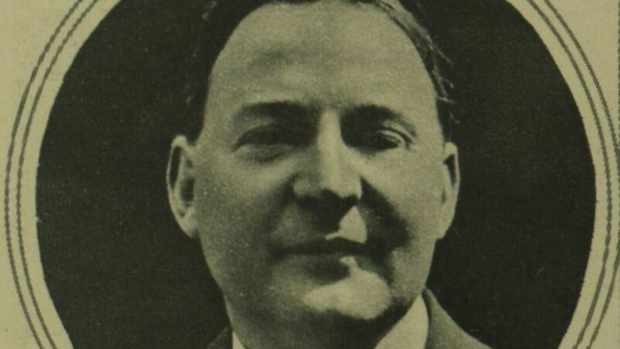
Wellington House: Britain's WW1 Propaganda Bureau
Split the class into groups of four. Cut up the sentences from the table below and hand them out to the groups, keeping a copy of the questions for yourself. Tell them to ask one student a question per slip of paper and to vary who they ask.
Let them spend about 15 minutes conversing and encourage them to develop their answers and the flow of conversation. After they’ve finished chatting, go through the list of questions. For example: “‘Are you going out tonight?’—Who asked that?” To which the student replies: “Sonia asked me if I was going out tonight.”
Who Asked That? Cards
Have you ever eaten something you didn’t like, to be polite? | Have you ever been stopped by the police? |
Do you watch too much TV? | Are you frightened of any insect or animal? |
Describe your personality. | Are you going to do your homework tonight? |
Are you reading a book at the moment? | Do you like watching soaps? |
Can you curl your tongue? | Do you think you are a positive person? |
What is your a favourite food? | Where did you go on holiday last summer? |
What’s your favourite movie? | Can you knit? |
What are you doing this weekend? | What did you do last weekend? |
Who is your favourite singer? | What did you have to eat yesterday? |
Do you like football? | What do you think is a boring activity and why? |
Can you describe your job/studies? | Tell me about your family? |
What do you want to do next year? | Do you remember losing your baby teeth as a child? |
Do you have a healthy diet? What do you eat? | Did you believe in Santa Claus? Do you remember finding out when he wasn’t real? |
Where do you live? Describe your home. | Which exercise do you like doing? |
What did you watch on TV last night? | What is your favourite city/town? |
Who in the class do you think would make a good president? | What’s your favourite animal? |

Utilizing famous movie quotes is a fun way to help you students understand and practise reported speech.
Felix Mooneeram | Unsplash
2. Famous Quotes
Everyone loves movies, so why not use some of the most famous movie quotes to practise reported speech?
Go to YouTube and watch this short selection of famous film quotes to engage the class. Get students to suggest quotes that they like (preferably not from what they have just watched) or lines from songs. Write these on the board, making sure the quotes/lines have a clause in them.
Go through the rules of the changes from direct speech to reported speech. Ask students to change the quotes/song lyrics on the board into reported speech. For example, “The name’s Bond, James Bond” becomes “He said his name was Bond.”
If your students can’t think of any, here are a few to put on the board:
- “You can’t handle the truth!”
- “Say hello to my little friend.”
- “I’m the king of the world!”
- “One does not simply walk into Mordor.”
- “May the odds be ever in your favour.”
- “Sell me this pen!”
- “Houston, we have a problem.”
- “There's no place like home.”
- “My name is Maximus Decimus Meridius, commander of the Armies of the North, General of the Felix Legions, and loyal servant to the true emperor, Marcus Aurelius. Father to a murdered son, husband to a murdered wife. And I will have my vengeance, in this life or the next.”
- “A martini. Shaken not stirred.”
- “The power of Christ compels you!”
- “Remember: What happens in Vegas stays in Vegas.”
3. Reported Speech Cards
This is another fun speaking activity that will help students learn reported speech.
Hand out slips of paper to students. One side of the paper is a direct speech sentence. One student reads out the sentence and his/her partner must report the speech to the class.
For example: “I won't go out tonight” becomes “He said he wouldn’t go out tonight.” Students award themselves a point for every correct sentence.
Student A Cards
- I can’t reach it.
- I need to go to the dentist.
- Will you phone Mum?
- Shut that door, it’s freezing!
- I haven’t been watching TV lately.
- He’s going to collect us at seven.
- What do you want the scissors for?
- We've had the house painted pink.
- Are you ready for tomorrow?
- Get your stuff ready.
- Won’t she be able to call us from the cinema?
- We’re going to pack our suitcases next week.
- We forgot to get the keys from you yesterday.
- I hadn’t thought of that before.
- I don’t believe what Mary said.
Cut along here ________________________________________________
Student B Cards
- They've been saving up for a house for years.
- Is it good enough for you?
- I won’t be able to see you until next month.
- Am I the only one who remembers this?
- I think we need to go over the exercise again.
- Are you sure he is alright?
- When did we book the table at the restaurant?
- I can’t believe she had a baby!
- When do you expect her to come?
- I will try to reach out to our contacts in the city.
- My grandmother went there when she was young.
- I hear your brother is at university.
- Do you know of anybody that wants to buy it?
- Have you seen the Lego movie?
- I was eating that sandwich!
- Will you make me a drink?

The Mediator is a classic ESL activity for learning and mastering reported speech.
4. The Mediator
This exercise, known as “The Mediator,” is an old-time classic for ESL teachers.
Put students into groups of three. Two of the students are from warring countries and do not talk directly to each other, while the student in the middle is the intermediary. The middle student reports to the enemy country what the other country has said. They must try to resolve their differences and make peace. If they cannot think of any ideas, see the list below.
Here are a few suggestions:
- Your GM crops keep blowing into my country.
- Your gasoline is too cheap, and my citizens keep going over the border to buy your fuel and it's bad for our economy.
- Your army is too close to my border.
- You invaded my territory.
- Some mad cows escaped from your farms and are knocking down fences and terrorising people.
- The water and air pollution from your leather factories is damaging tourism in my country.
- Your citizens are dumping rubbish across the border.
- Your flag is on a piece of land that belongs to us.
- You complained about us to the UN.
- Your anglers are overfishing the river that runs between both our countries.
Alternatively, you can tell the groups that they were a couple and have broken up. They are then to fight about things in their relationship.
5. Interviews
Split the class into pairs. One is the interviewer and the other is a famous person. The interviewer asks the other maybe five or six questions. The famous person gives an answer for each.
For example, “What do you do to relax?” becomes “I find that playing chess relaxes me.” Then the interviewer is asked to report what was asked and answered. For example: “Madonna said that she found playing chess relaxes her.”
- Reporting Verbs | Perfect English Grammar This web page explains how to use reporting verbs, gives a list of 15 common reporting verbs, and also offers some more advanced tips.
- How to Teach Reported Speech to Students | ThoughtCo. Learn how to teach reported speech to ESL and EFL classes with these tips, lessons, and practice materials.
- 7 Musical Hits to Get You Teaching Reported Speech Through Song | FluentU English Educator Blog 7 songs to help your ESL students understand reported speech and when to use it.
More ESL Articles for Teachers
- ESL/EFL: Teaching Word Families Learning word families can help your students gain greater understanding of the English language. Improve vocabulary, grammar and speaking and writing in the classroom using simple teaching methods.
- Teaching ESL: Creating a Lesson Plan in Four Steps A perfect guide for the ESL teacher. This article will outline how to create a lesson plan in four easy steps. Follow this guideline when planning a lesson for teaching English as a foreign language.
- How to Teach Vocabulary by Word Associations to ESL Learners Teaching vocabulary by word associations to ESL learners is an excellent method which I have employed in my school classes. Using this method, students can more easily comprehend and use words.
This content is accurate and true to the best of the author’s knowledge and is not meant to substitute for formal and individualized advice from a qualified professional.

10 More Fun Classroom Activities to Help Students Practice Speaking English

10 Fun Classroom Activities to Help Students Practice Speaking English

7 English Activity and Game Ideas for ESL Lessons
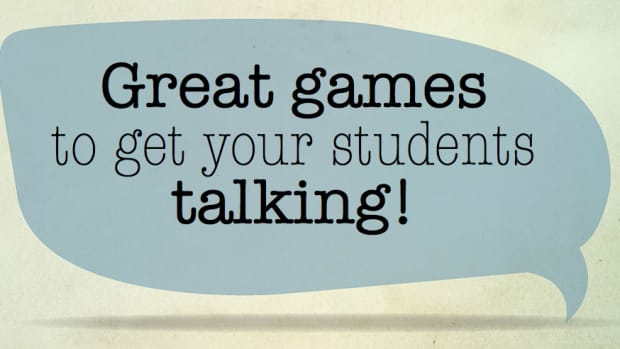
5 of My Favorite English Games for ESL Students

5 Common Grammar Errors ESL Students Make

10 Kiss Idioms Explained to ESL Students
Login Password

Reported Speech English Grammar Game for kids
This is an English grammar activity to practice and develop skills in using reported speech for kids.
Reported Speech We use reporting verbs like say, tell or ask to report what someone else said as a direct speech. Hence, reported speech is alternatively referred to as indirect speech. Since reported speech is often use to talk about the past, we normally change the tense of the spoken words. We change the reporting verb when we introduce the reported words. Inverted commas are not used when turning direct speech into reported speech. Use the exercise above to practice correctly reporting direct speech.
You might also like

We will appreciate your feedback.
Useful Sites
- FredisaLearns
- ESL Games World
- English 4 Kids
- ESL Kids Lab
- English Media Lab
- Turaco Games
Connect with us

This site uses cookies. By continuing to browse the site, you are agreeing to our use of cookies.
Reported speech games
Examples from our community, 4,865 results for 'reported speech games'.
Login Password
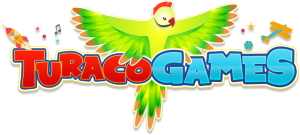
Reported Speech – Grammar Game for ESL
You might also like.

Highest Rated Games
Subscribe for offers.
Email Address *
Your name *
Blog Articles
- How to get your students talking
- The different uses of the present continuous
- Letting the learners take charge
We will appreciate your feedback.
Find us on facebook


All you need to know about teaching English abroad!
Blog / Teaching Ideas » 7 Activities for Teaching Reported Speech in the ESL Classroom
Linda Dunsmore
Teaching Ideas
7 Activities for Teaching Reported Speech in the ESL Classroom
Table of Contents
Listen to this blog post:, the go-between game, the lying game, pelmanism ("concentration"), reported speech "tennis", who asked what, find someone who…, are you ready to teach english abroad, related articles:, check out what our course grads say in our many video testimonials.
This is a fun dispute roleplay that is ideal when students are split up into groups of 3, although 4 can work too. Give students prompt cards with their roles (husband vs wife/neighbor vs neighbor/friend vs friend/server vs customer/politician vs voter ….). Also have topic cards to help them make a statement complaining about the other person, for example (husband vs wife: food/ temper/cleanliness/going out/television..).
One of the 3 or 4 students is nominated to be the mediator or "go-between" and must report the complaints and responses as they are given to them. For example, the wife might say to the mediator: "He threw some plates when he was angry", which would be reported to the husband as "She said that you had thrown some plates when you were angry". Try to keep the arguments going for as long as possible before swapping roles. Have the mediator pass judgment at the end of each round for an added element of fun.
Also read: How To Set Up Your EFL Classroom The Right Way
This is a fun game whereby students are given statements that they can either use as they are written or adapt, and others must try to find out whether they are telling the truth or lying. There is a similar game that's popular on UK TV called "Would I Lie to You?" For example, a student may take a slip of paper with "My brother is a pilot" and can either say this or something similar of their own choice, such as "My brother is a brain surgeon".
Other students then take turns to ask natural questions in any tense to find out more information, such as "Where did he study?" and then say whether they think the statement is true or false by saying something using reported speech. For example, "I think it's false because he said he had studied medicine at the London School of Economics".

Many people will be familiar with the game "Concentration". It's also known as 'Pelmanism' and is used as a standard activity in the ESL classroom based on memorizing cards or other objects placed in front of the players. This lends itself well to the standard change from direct to reported speech activity by having 8 pairs of cards with direct speech and matching reported speech on them, such as "I ate 6 sausages for lunch" matching with "You said that you'd eaten 6 sausages for lunch".
Students play in groups of 2-4 with the cards face down, separating the direct and reported ones, and take turns turning over one, changing to the matching form, and then turning over another. If they match, the student keeps them, if not they are turned back over and the next student has a go. The student with the most cards at the end of the game is the winner. You could have the students make their own version for other groups to use.
Also read: Top Online Lesson Plan Resources for New and Advanced Teachers
This is a fast-moving game that requires minimal preparation other than having slips of paper or card with vocabulary for people on, such as mother, teacher, police officer, best friend… These words also need to be on a word-bank that students have in front of them. The aim is for students to get others to guess the word that they pick up by using reporting verbs. For example "This person told me to get out of the car" = police officer. Think about how to maximize the fun-factor depending on your class size. Perhaps see how many words can be guessed by a team in 30 seconds before changing to the next team.
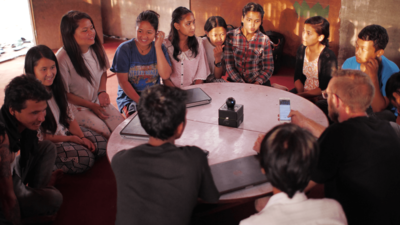
This can be played in pairs (singles tennis) or groups of 4 (doubles tennis). Put verbs in a given form on cards which are placed face down on the desk. A student picks up a card and must make any sentence using the verb. The opposing student must then report back. Example with 'took' – 'I took an exam last week' – 'she said she'd taken an exam last week'. The receiving student repeats the process back using the same word, for example – 'I took my brother to the airport yesterday'. Students continue and see who makes a 'fault' first. Keep score like tennis.
Also read: 7 Activities for Teaching Modal Auxiliary Verbs in the ESL Classroom
This is a mingling activity that's best suited to larger classes. Prepare simple questions for students to ask each other and put each on a separate slip of paper. Example questions are "Can you play the guitar?", "Are you going out tonight?". Give each student just one question and have them mingle round asking the question to as many people as possible and making a note of answers. You can then have a two-stage feedback session, both of which will use reported speech. Firstly, you can question students about what others had asked: "What did Kay ask?" > "She asked if I could play the guitar". Secondly, you can ask students what they found out: "Tom said he was going out tonight".
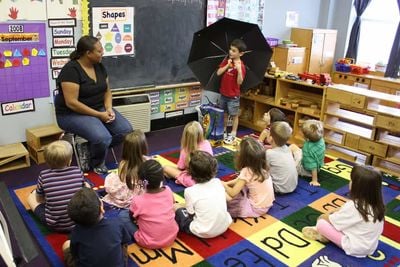
This is similar to the "Who asked what?" activity but is suited to any class size. Create a simple questionnaire for students to mingle with, asking each other questions and recording names and answers in note form. An example question could be "Find someone who went out for a meal last week?" (Ask where). Allow time for students to tell you what they found out, practicing use of reported speech. For example: "Liz said she had been out for a meal in town last week".
Also read: 10+ Activities For Teaching English Summer Camp
Do remember that reported speech requires a lot of practice by students learning the language, so these ideas should enable you to ensure students have fun whilst improving their English skills.
Apply now & get certified to teach english abroad!
Speak with an ITTT advisor today to put together your personal plan for teaching English abroad.
Send us an email or call us toll-free at 1-800-490-0531 to speak with an ITTT advisor today.
- The 5 Best Ways To Build Rapport With Your TEFL Students
- The Benefits of Having Good Rapport with Students
- The 10 Best Destinations for Teaching English Abroad in 2018
- 5 Great Places to Teach English Abroad Without a Degree
- The Top 5 TEFL Destinations For Adrenaline Junkies and Adventure Seekers
- Online or In-Class - Which TEFL Course Should You Take?
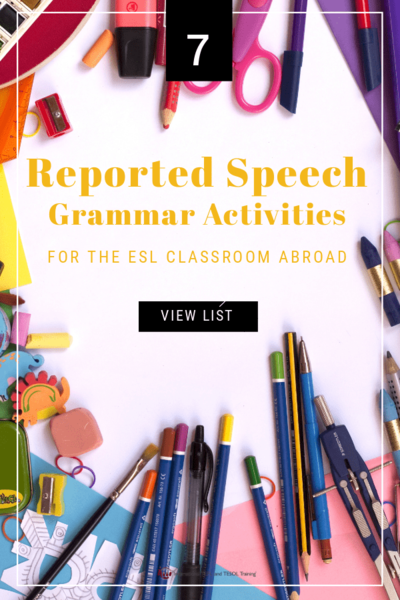
Want to live & work abroad? Get certified in TEFL/TESOL with ITTT.
Online, in-class, combined courses. apply today and get a 10% discount.

Do you want to be contacted to receive more information? Fill out the form, a member of our staff will contact you by phone.
All compulsory fields must be completed!
Login to your ITTT Online Course:
|
| |










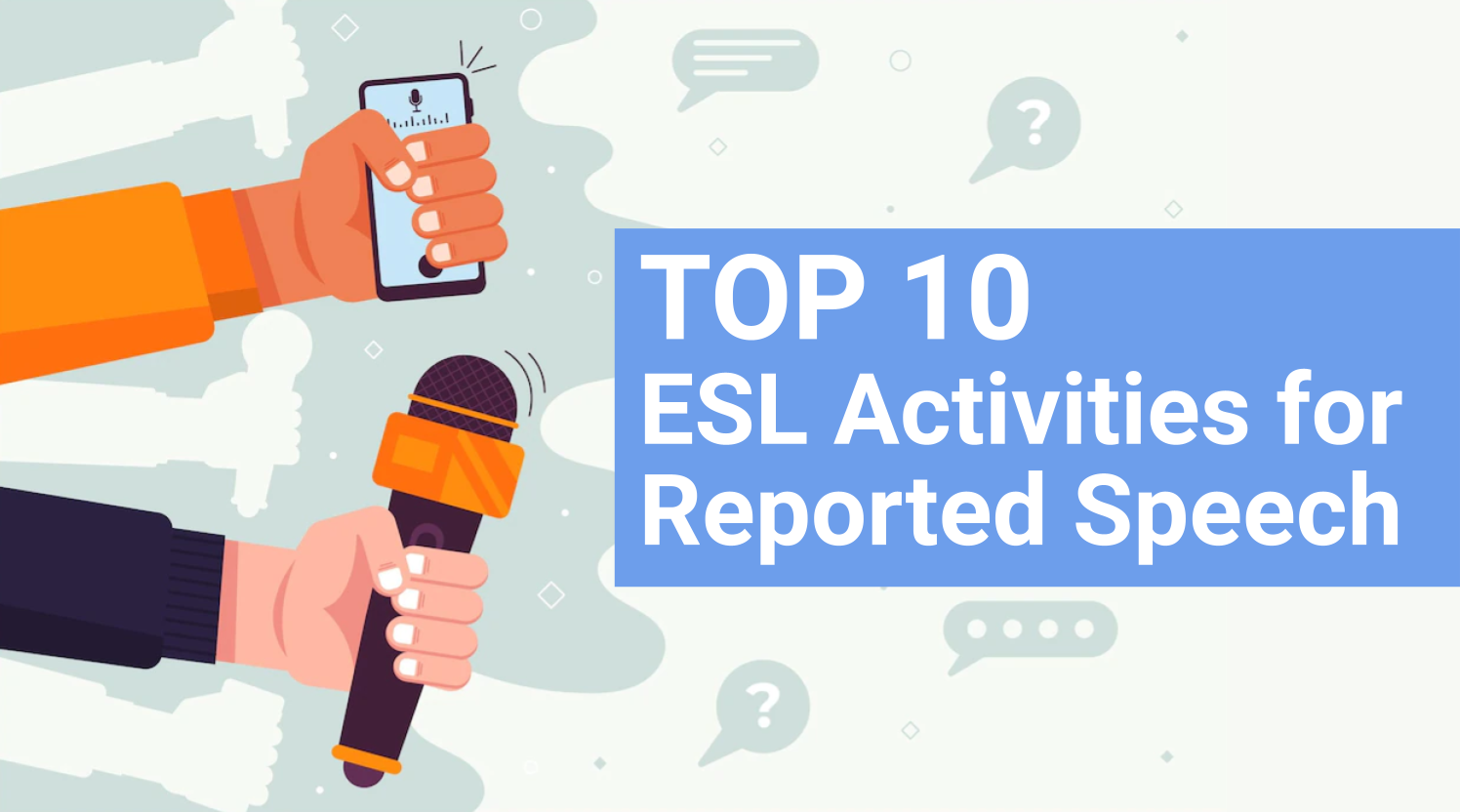
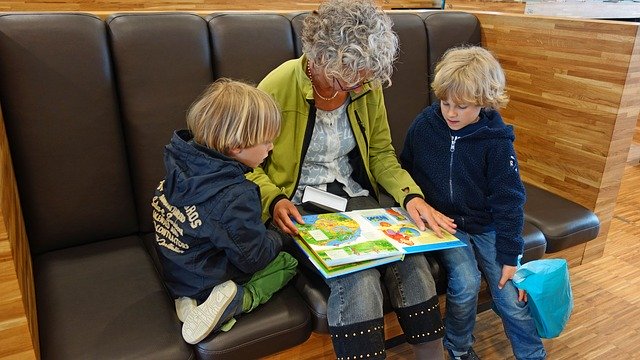
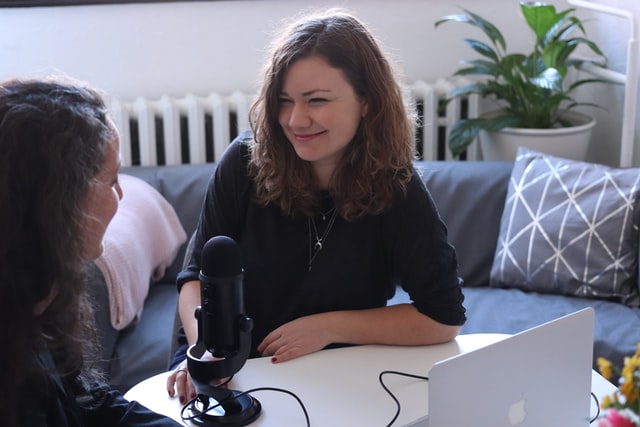
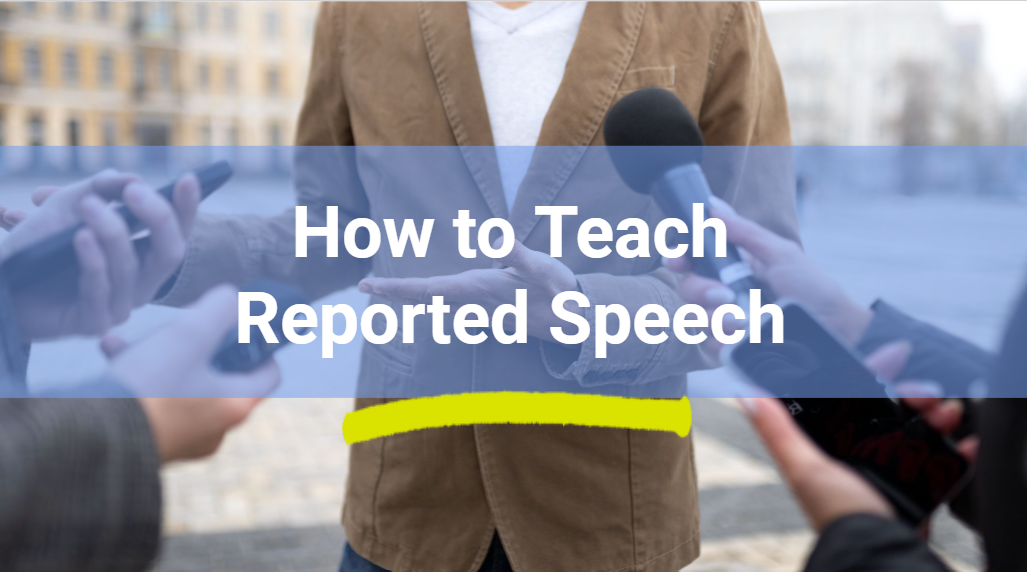
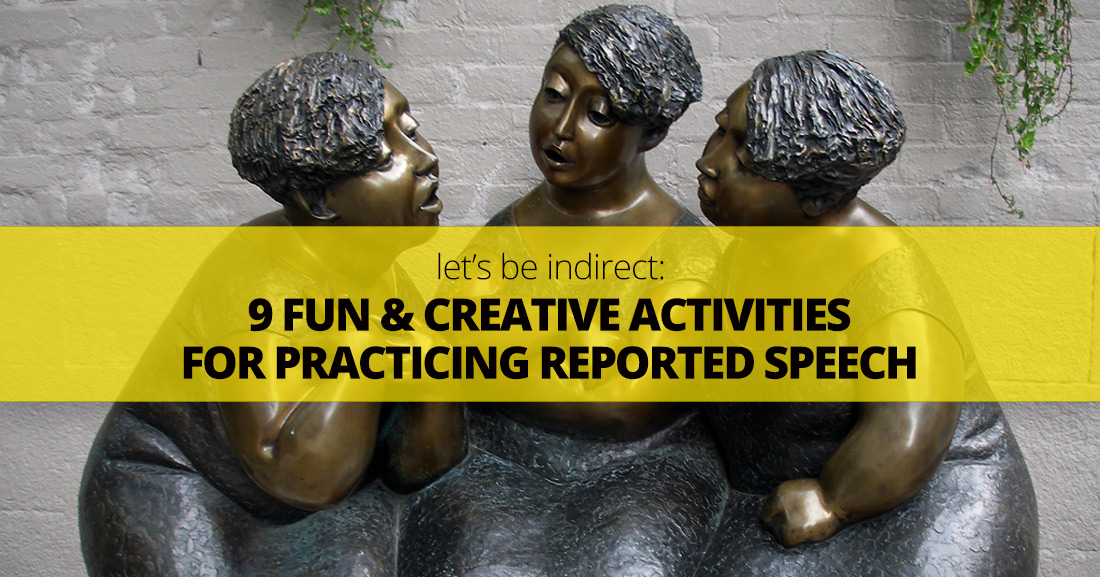









COMMENTS
ESL Reporting Modal Verbs Worksheet - Grammar Exercises: Identifying, Matching, Gap-fill, Rewriting Sentences, Writing a Paragraph - Intermediate (B1) - 30 minutes. In this useful reported speech worksheet, students learn the indirect form of four modal verbs and practice using them in reported speech. First, students read a short dialogue and ...
Try These Top 10 ESL Activities for Reported Speech. 1. Reported Speech Card Games. For some students, the best way to learn Reported Speech is by reading the statements they have to report. This is why we often write them on the board. Try these card games instead! For the first game, prepare a set of index card each with a direct speech ...
Or, buy the book and keep it as a handy reference on your bookshelf, or teacher supply room. You can check out 101 ESL Activities for yourself over on Amazon: Teaching Reported Speech FAQs. There are a number of common questions that people have about reported speech games and activities for English learners.
ESL Reported Speech Games. Let's get into the best activities and games for English learners. #1: Reported Speech Board Game. I love to play board games in real life which is why I also like to play them with my students! It's super easy to make your own to use for just about any grammatical point, including this concept.
By adult esl games. Crazy Questions. This is just a quick exercise to check understanding of reported speech questions. Put some examples on the board: ... One thought on " Reported Speech Activities " Nastya says: October 11, 2022 at 2:26 pm. Haha, an amazing activity. Reply.
Test your understanding of Reported Speech in English with this Reported Speech Quiz. Reported Speech, also known as indirect speech, is used to convey what someone else said without quoting their exact words. It often involves changes in tense, pronouns, and time expressions to suit the reporting context. For example, direct speech: " I am ...
Fun Ways of Practising Reported Speech. By Alex Case. Alex Case offers 15 ideas for getting learners to use indirect speech. 1. Reported speech reversi. Prepare cards with reported speech on one side and direct speech of the same sentence on the other. Students have to correctly say what is on the other side to turn it over and score one point.
12. Guess the it. Students report a sentence with a reference word like "it", "that", "him" or "one" in it, then the other students guess what it refers to. This can be done with jigsaw videos and listenings, as explained in the previous article on reported speech games. 13. Tell me more tell me more.
Shaken not stirred.". "The power of Christ compels you!". "Remember: What happens in Vegas stays in Vegas.". 3. Reported Speech Cards. This is another fun speaking activity that will help students learn reported speech. Hand out slips of paper to students. One side of the paper is a direct speech sentence.
1/1. Let's do English ESL board game. This is a boardgame which does not only practise reported speech, but it also encourages students to talk about different aspec….
Then write sentences using indirect speech on five to ten separate cards. Shuffle the cards together and lay them in a grid face down on the table. Students play against a partner to find the most matches for the sentences. To keep a pair, they must match the direct quote with the correct reported speech. 4.
Reported Speech - English Grammar Game for kids. This is an English grammar activity to practice and develop skills in using reported speech for kids. Reported Speech - We use reporting verbs like 'say', 'tell' or 'ask' to report what someone else said as a direct speech. Hence, reported speech is alternatively referred to as ...
6134. 55. 24. 0. 1/2. This is a board game connected with Reported Speech. Roll a dice and report the given sentences. The key is included. It can be used with all types of learners….
Wordwall makes it quick and easy to create your perfect teaching resource. Pick a template. Enter your content. Get a pack of printable and interactive activities. Find Out More. Reported Speech - Reported Speech - Reported speech - Reported Speech - REPORTED SPEECH - army + games - Wheel of Games - BrawlStars - Find My Singing Monsters.
If you're looking for some of the best reported speech games and activities, then I've got the top 5 of them for you in this video. Continue watching for the...
Reported Speech - Grammar Game for ESL. Practice and develop skills in using reported speech through this English grammar activity. Reported Speech - We use reporting verbs like 'say', 'tell' or 'ask' to report what someone else said as a direct speech. Hence, reported speech is alternatively referred to as indirect speech.
Reported Speech "Tennis". This can be played in pairs (singles tennis) or groups of 4 (doubles tennis). Put verbs in a given form on cards which are placed face down on the desk. A student picks up a card and must make any sentence using the verb. The opposing student must then report back.
408 Reported Speech (Indirect speech) English ESL worksheets pdf & doc. SORT BY. Most popular. TIME PERIOD. All-time. Zmarques. Reported Speech. It consists of seven. 102621 uses. estrelapolar. REPORTED SPEECH - CH. An easy way to teach. 49814 uses. dobrawaa. Reported Speech - a . This is a boardgame . 47170 uses. Zmarques. Reported Speech.
Grammar worksheets > Direct/reported speech > Reported speech games. reported speech with back shifting board game. Level: intermediate. Age: 14-17. Downloads: 734. Logic In Gossip - Reported Speech Logic Game (5pgs inc. cards and solution) Level: intermediate. Age: 13-17. Downloads: 531.
Game Code: 10255. Practice how to change from directed speech into reported speech. "You can have this bag". She told him that ...
English Teaching Forum. Find innovative, practical teaching ideas in this quarterly, peer-reviewed journal, which features articles written by teachers from around the world. We're on social media! Join our communities of English language learners and teachers from around the world and stay up-to-date on our programs, events, and content ...
Apr 1, 2024 - Let's do English ESL guided grammar production. Worksheet for adults and highschool students.The series board games should be a funny, playful way to practice v…
FAC Number Effective Date HTML DITA PDF Word EPub Apple Books Kindle; 2024-05: 05/22/2024
It consists of seven. 102640 uses. Zmarques. Reported Speech. A simple worksheet w. 45963 uses. dimond. reported speech. for 12-grade student.
Lawyers say it is unlikely regulators could bring a case against the meme-stock influencer based on the facts currently known. Keith Gill led hordes of individual investors into GameStop stock ...
Try These Top 10 ESL Activities for Reported Speech. 1. Reported Speech Card Games. For some students, the best way to learn Reported Speech is by reading the statements they have to report. This is why we often write them on the board. Try these card games instead! For the first game, prepare a set of index card each with a direct speech ...
Eduardo Verdugo/AP. MEXICO CITY — Claudia Sheinbaum, an environmental scientist and former mayor of Mexico City, was overwhelmingly elected Mexico's first female president on Sunday, a ...
Finn Russell has detailed how a secret trip to the Bahamas for intense treatment allowed him to return to help Bath into a Premiership final against Northampton Saints.. The 31-year-old fly-half ...
ALBANY, N.Y.—. New York plans to prohibit social-media companies from using algorithms to steer content to children without parental consent under a tentative agreement reached by state ...